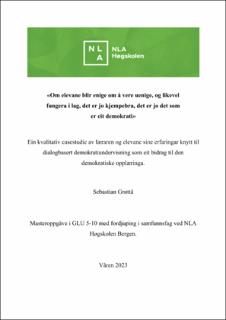| dc.description.abstract | Føremålet med denne masteroppgåva er å undersøke problemstillinga: «Korleis erfarer læraren og elevane i ei ungdomsskuleklasse dialogbasert demokratiundervisning som eit bidrag til den demokratiske opplæringa?». Eg besvarer problemstillinga ved å drøfte forskingsspørsmåla:
1. Korleis opplever læraren og elevane dialog i samband med demokratiundervisning?
2. Kva demokratiteoretiske kjenneteikn pregar dialogane i demokratiundervisninga?
3. Korleis opplever læraren og elevane demokratiopplæringa i lys av forholdet mellom demokrati som deltaking og som verdiar?
Gjennom eit casestudie og ved bruk av datainnsamlingsmetoden semi-strukturerte intervju har eg gått i dybden på ein lærar og fire elevar sine erfaringar knytt til dialogbasert demokratiundervisning. Funn i samband med forskingsspørsmål 1 viser at dialogen sitt utgangspunkt i demokratiundervisninga er forankra i sosiokulturell læringsteori framfor demokratiteori, trass i at læraren framhevar dialog som ein viktig del av demokratiet. Funn i samband med forskingsspørsmål 2 viser at læraren anerkjenner dialogar med deliberative kjenneteikn, på same tid som at han kritiserer eit overdrive søkelys på konsensussøkande dialogar. Læraren og elevane talar til fordel for uenighet, som resulterer i klasseromsdialogar med agonistiske kjenneteikn. Funn i samband med forskingsspørsmål 3 viser at læraren prioriterer demokratiske verdiar framfor demokratisk deltaking, men ser elevane si framtidige deltaking som eit resultat av å ha opplevd demokratiske prosessar og verdiar i klasserommet. Elevane framhevar demokratiet som deltaking framfor verdiar og viser til politisk deltaking.
Abstract:
The aim of this master thesis is to explore the following thesis statement: “How do the teacher and the students in a secondary school classroom experience dialogic democracy education as a contribution to democratic education?”. I address this thesis statement by discussing the following research questions:
1. How do the teacher and the students perceicve dialogue in relation to democracy education in classroom?
2. What are the democratic theoretical characteristics that characterize the dialogues in the democracy education session?
3. How do the teacher and the students perceive democracy education considering the relationship between democracy as participation and democracy as values?
Through a case study and the use of semi-structured interview data collection method, I explore the experiences of one teacher and four students regarding dialogic democracy education. The findings related to research question 1 indicate that the dialogue´s starting point in democracy education is rooted in socio-cultural learning theory rather than democratic theory, despite the teacher emphasizing dialogue as an important part of democracy. The findings related to research question 2 indicate that the teacher recognizes dialogues with deliberative characteristics, while at the same time criticizing an exaggerated focus on consensus-seeking dialogues. The teacher and the students speak in favour of disagreement, resulting in classroom dialogues with agonistic characteristics. The findings related to research question 3 indicate that the teacher prioritizes democratic values over democratic participation but sees the students´ future participation as a result of having experienced democratic processes and values in the classroom. The students prioritize democracy as participation over values and refer to political participation. | en_US |
